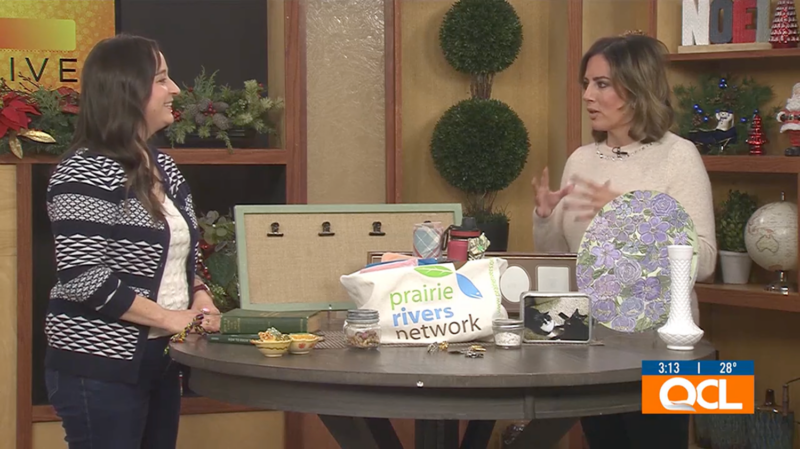
Gifts and gifts and more gifts – oh my! While so many of us love giving and receiving gifts, all that clutter can feel like chaos when the glow of the holiday season is over. Not only is all the “stuff” sometimes overwhelming, but it’s also not the greatest for our environment.
This holiday season, choosing sustainable gifts is crucial for environmental conservation. By selecting eco-friendly, locally-produced, or second-hand presents, consumers can significantly reduce their carbon footprint and minimize waste.
Sustainable gifts often support small businesses, use recycled materials, or promote long-lasting, high-quality products that don’t contribute to the disposable consumer culture. Moreover, these thoughtful choices help raise awareness about environmental issues and encourage recipients to make more sustainable lifestyle decisions.
To learn more about sustainable gift giving and see some of these ideas in action, check out our segment on Quad Cities Live with our River Health and Resiliency Organizer, Nina Struss.
From reusable items and energy-efficient gadgets to experiences that create memories without material consumption, sustainable gifts represent a meaningful way to show care for both the recipient and the planet. Here are some great ideas to incorporate into your gift giving this holiday season.
Give the gift of a “kit”
A themed kit can transform gift-giving into a memorable and personalized experience. By curating a collection of items around a specific interest or passion, you create a thoughtful gift that shows deep understanding of the recipient’s hobbies and preferences. Some examples include:
- Zero-Waste Kit: These are great for someone who is committed to lowering their environmental impact. Think about loading a reusable tote bag with reusable straws, beeswax wraps, reusable produce bags and a stainless steel or glass water bottle or coffee cup. Need more ideas? Visit a local zero waste store!
- DIY herb garden kit: Select a cute pot and fill it with seeds, soil discs, gloves and wooden markers.
- Pollinator garden kit: Help support local pollinators and beautify their space by gifting wildflower seeds with soil discs, gloves and wooden markers.
Consider handmade or upcycled gifts
Handmade and upcycled gifts offer a unique and thoughtful alternative to mass-produced presents, reflecting both creativity and environmental consciousness. These gifts carry personal significance and often tell a story, making them memorable keepsakes. Ideas can include jewelry, clothing that uses upcycled fabrics, homemade candles or soaps or DIY photo frames.
Search for second hand finds
Shopping second-hand for gifts offers a unique and thoughtful approach to gift-giving that benefits both the recipient and the environment. By choosing pre-owned items, you can often find high-quality, vintage, or designer pieces at a fraction of their original cost, allowing you to give more meaningful and distinctive gifts. Second-hand shopping reduces waste, supports sustainability by extending the life of existing products, and helps minimize the demand for new manufacturing. Additionally, thrift stores, vintage shops, and online marketplaces offer a treasure trove of one-of-a-kind items that can show extra care and creativity in your gift selection. From retro clothing and collectible books to gently used electronics and artisan crafts, second-hand gifts can be both economically and environmentally responsible while providing a personal touch that new, mass-produced items often lack.
Think through non-physical presents
Clutter can become a real pain, and is often not very environmentally friendly. Finding gifts that don’t require something physical, but remain meaningful can be easy. Examples include digital gift cards, streaming subscriptions, online classes, ebook/audiobook credits, virtual experiences, or charitable donations – all of which can be meaningful while having minimal environmental impact.
Give the gift of an experience
Gifting experiences rather than material possessions has become increasingly popular, and for good reason. Unlike physical items that can quickly lose their novelty, experiences create lasting memories and emotional connections that continue to bring joy long after the moment has passed. Experiences such as concert tickets, cooking classes, travel adventures, or museum passes offer recipients the opportunity to learn new skills, explore personal interests, and create unique stories that can be shared with others.
Finally, shop local!
Shopping locally during the holiday season can significantly reduce environmental impact by cutting down on transportation emissions, since products don’t need to be shipped long distances from warehouses or international manufacturers. Local shopping often involves less packaging waste compared to items that must be protected for long-distance shipping and delivery. Small local shops also frequently stock items made by local artisans and craftspeople who typically produce in smaller batches with more sustainable practices than mass manufacturing.







